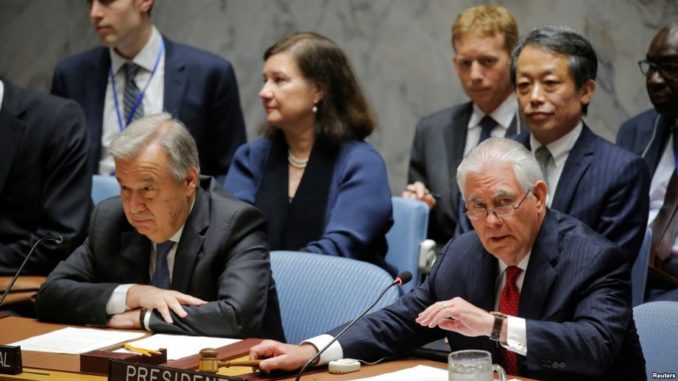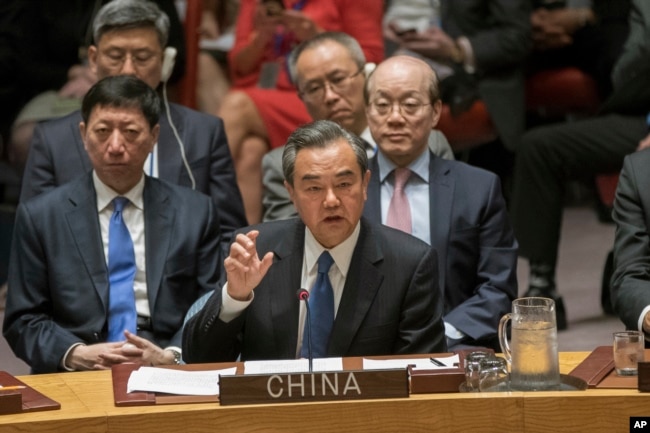
UNITED NATIONS — U.S. Secretary of State Rex Tillerson said Friday that Washington would not rule out a military response to future North Korean aggression and that it would seek to increase the rogue nation’s financial and international isolation.
“As we have said before, all options for responding to future provocation must remain on the table,” Tillerson told a high-level meeting of the U.N. Security Council on the North Korean nuclear issue.
“Diplomatic and financial levers of power will be backed up by a willingness to counteract North Korean aggression with military action if necessary,” he warned. “We much prefer a negotiated solution to this problem, but we are committed to defending ourselves and our allies against North Korean aggression.”
Tillerson said this new campaign of intensified pressure would be swiftly implemented and “painful to North Korean interests,” but he insisted that regime change is not a part of it.
He added that talks would not happen before North Korea takes concrete steps to dismantle its illegal weapons programs.
Tillerson laid out what Washington wants the international community to do to stop North Korea’s pursuit of nuclear weapons, calling for increased diplomatic and economic pressure on Pyongyang to get it to change course, including new targeted sanctions.
“We must bring maximum economic pressure by severing trade relationships that indirectly fund the DPRK’s nuclear and missile program,” he said. “I call on the international community to suspend the flow of North Korean guest workers and to impose bans on North Korean imports, and especially coal.”
He singled out China, urging it to exert its powerful economic leverage over North Korea.
He also asked states to downgrade their diplomatic relations with Pyongyang and to fully implement existing U.N. Security Council resolutions regarding North Korea.
“Those nations which have not fully enforced these resolutions fully discredit this body,” Tillerson said.
“For years, North Korea has been dictating the terms of its dangerous course of action; it is time for us to retake control of the situation,” Tillerson added.
The United States called for Friday’s meeting as part of its presidency this month of the Security Council. It was Tillerson’s first time at the world body and the Security Council chamber was packed, as nations are eager to have a clear indication from the Trump administration on where it is headed on the dangerous North Korea issue.

Chinese Foreign Minister Wang Yi speaks during a ministerial level Security Council meeting on the situation in North Korea, April 28, 2017, at United Nations headquarters.
China remains firm
Several foreign ministers attended Friday’s high-level session, including China’s Wang Yi. He deflected President Donald Trump’s recent calls on Beijing to solve the North Korean problem.
“China is not a focal point of the problem on the peninsula and the key to solving the nuclear issue on the peninsula does not lie on the Chinese side,” Wang told the council.
“China has, over the years, made unremitting efforts and played a unique role in promoting a negotiated solution,” he added.
China’s position remained consistent, with the minister calling for North Korea to stop its nuclear and ballistic missile activities and return to its international commitments. He also called on other parties to work constructively for the denuclearization of the Korean peninsula.
“We must stay committed to the path of dialogue and negotiations,” Wang said. “The use of force does not solve differences and will only lead to bigger disasters,” he cautioned.
South Korea’s Foreign Minister Yun Byung-se delivers his remarks in the Security Council at United Nations headquarters, April 28, 2017.
Anxious neighbors
“We must act now, we are racing against time,” said South Korean foreign minister Yun Byung-se, whose country is on the frontline of the crisis. “Extraordinary circumstances require extraordinary responses,” he urged.
He called for tougher new international sanctions, saying they are necessary. “Our goal is not to bring North Korea to knees, but to bring it back to the negotiation table for genuine denuclearization.”
Japan’s foreign minister Fumio Kishida urged the international community to send a message to Pyongyang that provocation comes at a high price. “No bright future awaits North Korea without denuclearization.
Russia, which shares a short border with North Korea, also expressed concern about the growing tensions.
“The combative rhetoric coupled with reckless muscle-flexing has led to this situation where the whole world sits seriously now wondering whether there’s going to be a war or not,” Deputy Foreign Minister Genady Gatilov told the council.
Source – VOA
